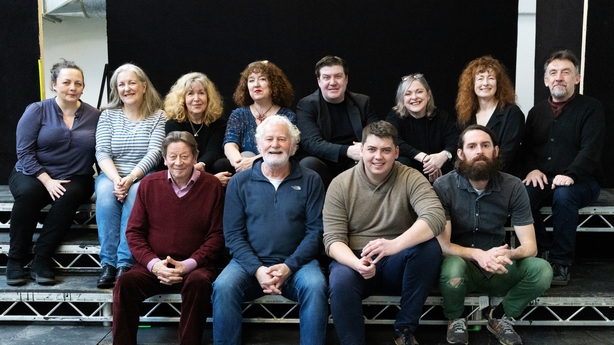Labhair muid le Conor Hanratty faoin dráma a bheidh ar stáitse na Péacóige, Amharclann na Mainistreach go luath, an dráma is sine sa teanga is sine san Eoraip.
Tá an-spéis agat, is léir, sna tragóidí Gréigeacha, an dóigh leat go bhfuil sé dúshlánach dráma atá chomh sean a thabhairt ar an stáitse agus a bheith tráthúil don lucht féachana?
Is breá liom na drámaí seo. Is iad bunchloch na drámaíochta Eorpaí, agus tá na ceisteanna a chuireann siad fós ábhartha inniu. Is foirm drámaíochta é atá chomh sean leis an daonlathas, agus leis an bhfealsúnacht, agus tá siad deartha le bheith gríosaitheach. Bíonn an taithí dhaonna tráthúil i gcónaí.
Baineann scéal na Peirsigh le ceist an náisiúin agus dár ndóigh, leis an tslí go dtéann an duine daonna i ngleic le cogadh, anois go bhfuil muid ag féachaint ar an méid atá ag titim amach in san Eoraip agus níos faide i gcéin, sa Phailistín, an dóigh leat go bhfuil bá nádúrtha ag muintir na hÉireann lena leithéid?
Tarlaíonn an dráma tar éis cath mór. Is scéal náisiún beag oileánach é, náisiún atá ag troid ar son a cheart a bheith ann i gcoinne a chomharsana, impireacht mhór ar an taobh thoir. Tá cosúlachtaí láithreacha ann a thuigfeadh aon lucht féachana Éireannach, agus ar ndóigh tá an dinimic seo le feiceáil i go leor áiteanna ar fud an domhain inniu.
Éist anseo le Conor agus cuid den gcliar ag caint le Tristan Rosenstock ar an gclár An Cúinne Dána ar RTÉ Raidió na Gaeltachta faoin léiriú.
We need your consent to load this rte-player contentWe use rte-player to manage extra content that can set cookies on your device and collect data about your activity. Please review their details and accept them to load the content.Manage Preferences
You have brought Nuala Ní Dhomhnaill on board as translator for this project, how has the added element added to the production, especially given Nuala's background in poetry?
Tá Nuala ar dhuine de na scríbhneoirí is fearr againn, agus mhothaigh mé gur rogha iontach spreagúil a bheadh ann iarraidh ar fhile mór na Gaeilge a cuid saineolais a thabhairt don téacs ársa, iontach seo. Is píosaí casta, fileata iad tragóidí Gréagacha, mar sin bhí sé thar a bheith riachtanach iarraidh ar fhile an dráma seo a aistriú.

How does one go about directing a play as old as The Persians, when it comes to staying true to its roots versus a contemporary reading?
Well, that's a great question. I have an MA in Greek Theatre Performance, and for many years I worked on a summer course all about ancient drama at the famous theatre of Epidaurus. So I have been lucky enough to see and learn from a great many amazing productions of these plays. I’ve spent a lot of time studying what makes a Greek tragedy, so the complex structure of the play feels like an exciting challenge. The added context of staging the play as Gaeilge is an extra layer of interest, since we are imbuing the production with several elements of Irish poetry and music.
For example, there’s an aisling in this play, but it appears to a woman, and then there’s a big lament at the end, but it’s performed by a man. So by crossing Irish poetry with Greek tragedy we are already having to navigate gender roles in poetry, and by default our version is a reversal. It’s an intriguing challenge, but I think we have some beautiful solutions to share. Any contemporary production of a play this old will demand new choices and new solutions - and that’s what makes it exciting.
We need your consent to load this rte-player contentWe use rte-player to manage extra content that can set cookies on your device and collect data about your activity. Please review their details and accept them to load the content.Manage Preferences
Experiencing the oldest play in Europe in the oldest language in Europe is an exciting prospect for audiences. What are you hoping the audience will take home from the production?
While it is a terrific movie, there’s an unhelpful plot-point in American Fiction that relies on The Persians being one of the most obscure texts in all of world literature! While it is certainly a very old play, it challenges an audience to consider the horror of war, the human cost of conflict and the power of empathy. Perhaps we need a play as old as this to use as a lens to consider the landscape today - through this distance we can maybe consider the state of the world. And also, of course, getting to hear these amazing actors speak Nuala’s beautiful Irish will, I hope, be a real treat.
The Abbey Theatre is bringing a new Irish-language translation of Aeschylus' Greek masterpiece Na Peirsigh / Persians by renowned writer and poet Nuala Ní Dhomhnaill to the Peacock Stage. The foundations laid by Lady Gregory 120 years ago inspired the Abbey Theatre to look further back at the foundation of the art form of theatre itself in Ancient Greece.
Léireoidh Amharclann na Mainistreach aistriúchán nua Gaeilge ar thraigéide Ghréagach Aeschylus, Na Peirsigh / Persians leis an scríbhneoir agus an file cáiliúil Nuala Ní Dhomhnaill ar Stáitse na Péacóige. Spreagadh Amharclann na Mainistreach, tar éis machnamh a dhéanamh ar an mbunsraith a leag Lady Gregory 120 bliain ó shin, súil a chaitheamh níos faide siar ar bhunús na foirme ealaíne féin sa tSean-Ghréig.
Performed in Irish, with English surtitles.
